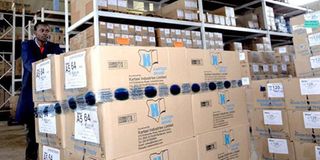E. Africa to lead Africa in rising demand for warehousing space

A worker in Kartasi Brand warehouse in Nairobi’s Industrial Area. FILE PHOTO
What you need to know:
New research from JLL, a global commercial real estate firm, predicts that demand for industrial space will by next year grow faster in East Africa than in any other region on the continent, Lynet Igadwah writes.
Demand for warehousing space is set to grow faster in East Africa than anywhere else on the continent over the next 10 years, increasing pressure on facilities that are hardly meeting market needs.
Companies looking for warehousing space in East Africa have to contend with a shortage and when they do find facilities, these are often poorly constructed and maintained. Yet, demand for warehousing facilities is on the rise in tandem with economic growth and as Kenya positions itself as a regional logistics hub.
New research from JLL, a global commercial real estate firm, predicts that demand for industrial space will by next year grow faster in East Africa than in any other region on the continent.
“By Q1 of 2018, total demand in East Africa should surpass total demand in West Africa for the first time,” writes JLL in its Africa Prime Industrial Report 2017.
The report singles out Ethiopia as key driver of the growth in the region mostly due to the country’s industrial production potential and its population of over 100 million. Demand for industrial space is set to grow at six per cent annually in Ethiopia. Uganda and Kenya will grow at 5.1 per cent and 3.6 per cent, respectively. This implies that there will be more companies in the region competing for the available space. There are indications that real estate investors in the region are positioning themselves to meet the rising demand. In a report released last month, financial services firm Britam says that Nairobi will welcome multi-billion investments in logistics in the post-election period.
Logistics firms ALP is setting up a 50,000 square metre facility at the planned Tatu City while Tilisi has invested in a 400 acre logistics park.
E. Africa vs W. Africa
While East Africa is growing, West Africa will slow down owing to security concerns faced by Nigeria.
The country is grappling with attacks from militia group Boko Haram. Nigeria, will see demand grow at an estimated 1.4 per cent over the next 10 years.
South Africa will remain a key destination for investments in industrial space.
However, since the country is coming from a relatively high base, with the most sophisticated facilities, it is expected that the country will grow at only 1.6 per cent over the decade.
Although JLL’s detailed survey is limited, having been carried out on 11 African countries, it echoes the findings of other studies as well as local government statistics on growth.




